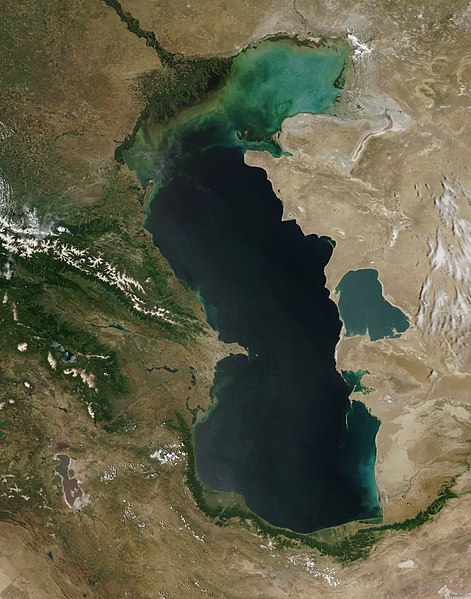Lahabali kɔligu:Caspian Sea from orbit.jpg

Jɔhiyuli maa galisim:471 × 599 anfooni bihi bihi. Din pahi resolutions: 188 × 240 anfooni bihi bihi | 377 × 480 anfooni bihi bihi | 603 × 768 anfooni bihi bihi | 804 × 1,024 anfooni bihi bihi | 1,609 × 2,048 anfooni bihi bihi | 4,400 × 5,600 anfooni bihi bihi.
Faal maa maŋmaŋa (4,400 × 5,600 pixels, file size: 3.44 MB, MIME type: image/jpeg)
Faal tarihi
Dihimi dabisili/saha n-nya kɔl' bihi kamani di ni di yina shɛm
| Zuŋɔ dabisili/Saha | Thumbnail | Di tarisi | ŋun su | tɔhibu | |
|---|---|---|---|---|---|
| din na chana | 09:16, 14 Silimin gɔli June 2010 |  | 4,400 × 5,600 (3.44 MB) | Originalwana | higher res |
| 15:10, 8 Silimin gɔli February 2005 |  | 550 × 700 (67 KB) | Pixeltoo | Caspian sea by space Nasa |
Lahibali kɔligu zaŋ tum tuma
Yaɣi shɛli kani din mali lahabali kɔligu ŋɔ n-kuri bukaata.
Duniya zaa lahabali kɔligu zaŋ tum tuma
Wikis shɛŋa ŋan dolina ŋɔ gba malila faal ŋɔ n kuri bukaata:
- Zaŋ tum tuma af.wikipedia.org zuɣuc
- Zaŋ tum tuma als.wikipedia.org zuɣuc
- Zaŋ tum tuma am.wikipedia.org zuɣuc
- Zaŋ tum tuma ang.wikipedia.org zuɣuc
- Zaŋ tum tuma an.wikipedia.org zuɣuc
- Zaŋ tum tuma arc.wikipedia.org zuɣuc
- Zaŋ tum tuma ar.wikipedia.org zuɣuc
- بحر قزوين
- ويكيبيديا:صور مختارة/الفضاء والكون/نظرة إلى الخلف
- ويكيبيديا:ترشيحات الصور المختارة/بحر قزوين
- ويكيبيديا:صورة اليوم المختارة/ديسمبر 2016
- قالب:صورة اليوم المختارة/2016-12-23
- مستخدم:قائمة أكبر البحيرات والبحار في المجموعة الشمسية
- ويكيبيديا:صورة اليوم المختارة/يوليو 2020
- قالب:صورة اليوم المختارة/2020-07-16
- ويكيبيديا:صورة اليوم المختارة/يوليو 2023
- قالب:صورة اليوم المختارة/2023-07-26
- Zaŋ tum tuma arz.wikipedia.org zuɣuc
- Zaŋ tum tuma ast.wikipedia.org zuɣuc
- Zaŋ tum tuma as.wikipedia.org zuɣuc
- Zaŋ tum tuma av.wikipedia.org zuɣuc
- Zaŋ tum tuma azb.wikipedia.org zuɣuc
- Zaŋ tum tuma az.wikipedia.org zuɣuc
- Zaŋ tum tuma bat-smg.wikipedia.org zuɣuc
- Zaŋ tum tuma be.wikipedia.org zuɣuc
- Zaŋ tum tuma bew.wikipedia.org zuɣuc
- Zaŋ tum tuma bg.wikipedia.org zuɣuc
- Zaŋ tum tuma bh.wikipedia.org zuɣuc
- Zaŋ tum tuma bn.wikipedia.org zuɣuc
- Zaŋ tum tuma br.wikipedia.org zuɣuc
- Zaŋ tum tuma bs.wikipedia.org zuɣuc
- Zaŋ tum tuma bxr.wikipedia.org zuɣuc
- Zaŋ tum tuma ca.wikipedia.org zuɣuc
- Zaŋ tum tuma ce.wikipedia.org zuɣuc
- Zaŋ tum tuma ckb.wikipedia.org zuɣuc
- Zaŋ tum tuma co.wikipedia.org zuɣuc
- Zaŋ tum tuma cs.wikipedia.org zuɣuc
Yulima more global usage zaŋ chaŋ lahabali kɔligu ŋɔ.


